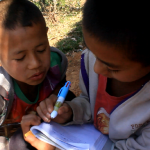
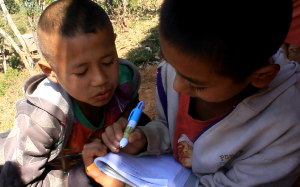 Conflict in Myanmar (Burma) over the past three decades has resulted in a mass movement of populations into Thailand. Nearly 130,000 refugees live in nine camps along the Thailand-Myanmar border, with children making up half the camp population. While the school system in camps is relatively well-established, teaching in refugee schools is a challenging profession: teachers are underpaid, lacking in status, and receive inadequate training and support.
Conflict in Myanmar (Burma) over the past three decades has resulted in a mass movement of populations into Thailand. Nearly 130,000 refugees live in nine camps along the Thailand-Myanmar border, with children making up half the camp population. While the school system in camps is relatively well-established, teaching in refugee schools is a challenging profession: teachers are underpaid, lacking in status, and receive inadequate training and support.
Under the Quality Cross-Border Education Support in Thailand (QUEST) project World Education worked to increase the ability of teachers in refugee camps. Led by Save the Children, in collaboration with the Karen Refugee Education Entity (KRC-EE), Shanti Volunteer Association (SVA), and Mobile Education Partnerships (MEP), the QUEST project aimed to improve the quality of education for displaced children from Myanmar, while building resiliency and reducing risk in refugee communities. The project emphasized improving literacy outcomes and supporting the psychosocial development of children both in school and in refugee communities through reading-based activities.
Within QUEST, World Education provided managerial oversight and technical assistance in its partnership with MEP and KRC-EE to provide subject-based training to over 1000 camp teachers, conduct follow-up visits and development sessions with trained teachers, and improve student literacy and social and emotional learning in the camps. Through the project, World Education also aimed to build the capacity of local education partners, such as the KRC-EE, in order to institutionalize best practices from lessons learned in camp education.
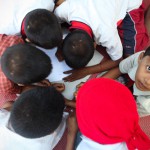
Migrant children from Myanmar (Burma) living in Thailand are particularly vulnerable to abuse, exploitation, and neglect. The IMPACT project addressed these vulnerabilities through a comprehensive child protection system that equally emphasized both prevention of and response to child abuse, exploitation and neglect. World Education worked with a network of organizations to implement the IMPACT project, including the International Rescue Committee (IRC), the Committee for Protection and Promotion of Child Rights (CPPCR), and Social Action for Women (SAW).
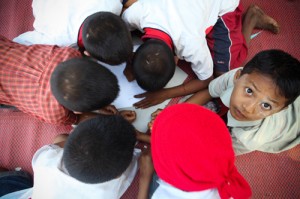 World Education worked with communities to raise their awareness of threats to child protection. World Education also partnered with CPPCR to establish a child protection network and develop a referral and case management system in which all relevant actors work together to provide a solid, timely and quality response for children according to best practice standards. Additionally, World Education developed CPPCR’s organizational capacity and provided technical advice and institutional support.
World Education worked with communities to raise their awareness of threats to child protection. World Education also partnered with CPPCR to establish a child protection network and develop a referral and case management system in which all relevant actors work together to provide a solid, timely and quality response for children according to best practice standards. Additionally, World Education developed CPPCR’s organizational capacity and provided technical advice and institutional support.
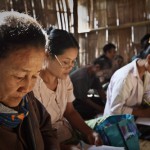
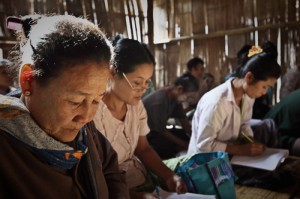 Approximately 130,000 refugees from Myanmar (Burma) live in refugee camps along the Thailand-Myanmar border, and well over 400,000 live unofficially in Thai communities along the border. Some of the refugees have lived along the border for a decade or more, and have seen whole generations of children grow in the camp environment.
Approximately 130,000 refugees from Myanmar (Burma) live in refugee camps along the Thailand-Myanmar border, and well over 400,000 live unofficially in Thai communities along the border. Some of the refugees have lived along the border for a decade or more, and have seen whole generations of children grow in the camp environment.
World Education, working with the International Rescue Committee and funded by a grant from USAID, acted under SHIELD to increase access to and improve the quality of education for Burmese refugees and migrants in Thailand. World Education trained teachers and school administrators, and worked on the development of curriculum and teaching materials and special education. To assist refugees and displaced people living outside of the refugee camps in Thai villages, and to the Thai villagers who host them, World Education also provided targeted educational support to several Thai communities along the Thailand-Myanmar border. All work was carried out in cooperation with community-based organizations (CBOs) working along the border to ensure sustainability and effectiveness of the training efforts, and to create a sustainable education system that can be quickly adapted when displaced families return to Myanmar.
SHIELD led to 1,162 migrant parents actively supporting their children’s schools by providing food, labor, and donations. More than 9,000 teachers, 400 school directors, and 8,000 parents were trained by World Education to help improve the education for children from Myanmar who attend schools in Thailand. 42,000 standards-based textbooks in Thai, English, math and science have been delivered to migrant schools for grades 1-6 creating the first standards-based curricula for migrant schools.
The result of these efforts has helped ensure a brighter future for refugee and migrant children on the Thailand-Myanmar border.
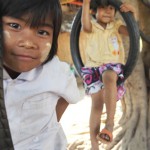
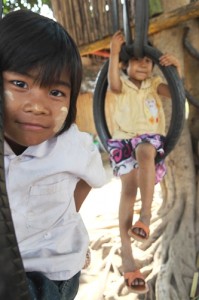 The political instability, unrest, violence, and socio-economic problems in Myanmar (Burma) have driven tens of thousands of people away from their country. Burmese, Karen, and other ethnic minorities have been fleeing their homes for refugee camps since the early 1980’s. Human rights abuses have been well documented, including execution of those who do not comply with the demands of the soldiers, forced labor, rape, and denial of the right to education. The trauma of active conflict — and the resulting loss of life, family disruption, loss of land and livelihood — has compounded this.
The political instability, unrest, violence, and socio-economic problems in Myanmar (Burma) have driven tens of thousands of people away from their country. Burmese, Karen, and other ethnic minorities have been fleeing their homes for refugee camps since the early 1980’s. Human rights abuses have been well documented, including execution of those who do not comply with the demands of the soldiers, forced labor, rape, and denial of the right to education. The trauma of active conflict — and the resulting loss of life, family disruption, loss of land and livelihood — has compounded this.
As a consequence of this enormity, children and youth have been witnesses and/or participants in traumatic events including violence and sometimes the death of their loved ones. Many youth have lost their homes, belongings, and are separated from families. They live in constant fear of further forced displacement. The children’s education has often been disrupted. Largely they remain silent, absorbing and reflecting the fear and anger of their parents, siblings, and community members – and often they do not have a way to share their personal painful experiences.
The COPE project increased the awareness of Karen educators and leaders concerning psychosocial issues and how they affect children in schools. In addition it enhanced the education system to provide a “psychosocial sensitive” environment by developing the capacity of trainers, educators and support systems to address the psychosocial needs of children and youth; developing a training of trainers curriculum; and designing a curriculum integrated into a Social Studies / Living Values curriculum for primary and secondary schools of the Karen education system in the refugee camps. The success of the program lay with the close collaboration between World Education and the Karen Education Department and the other NGOs working in education with the refugee and migrant population.
World Education successfully implemented COPE for UNICEF until the end of 2011.
